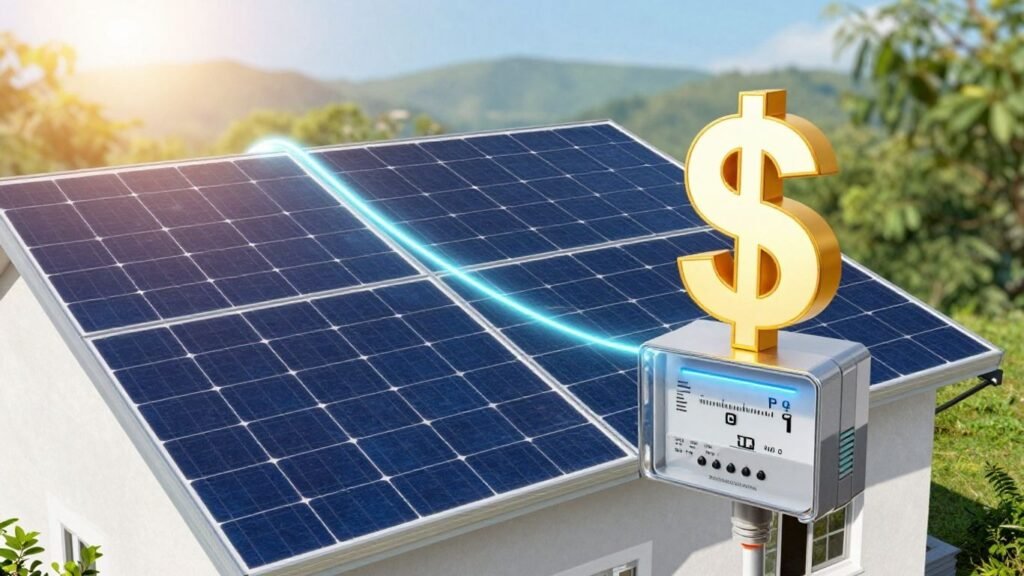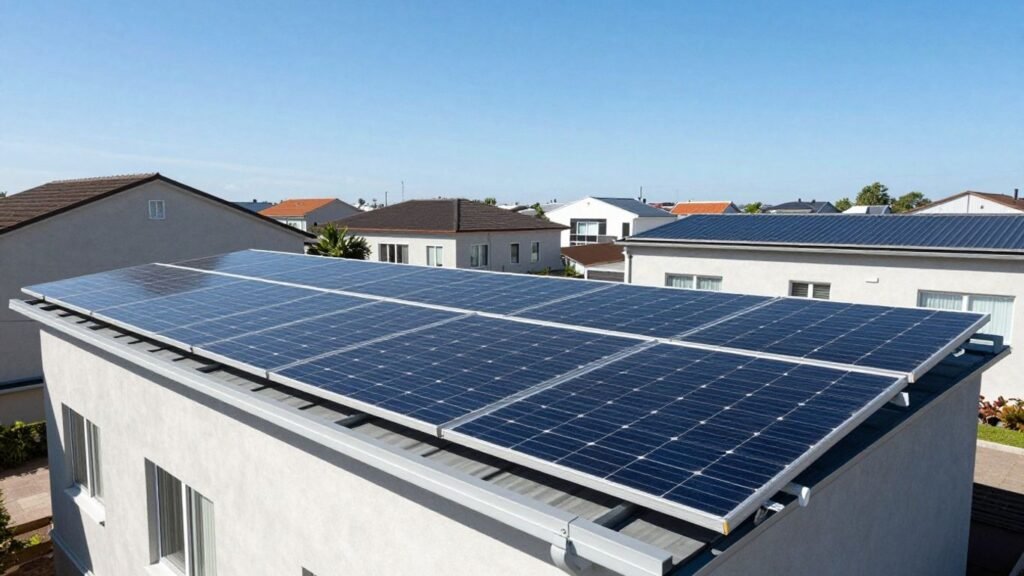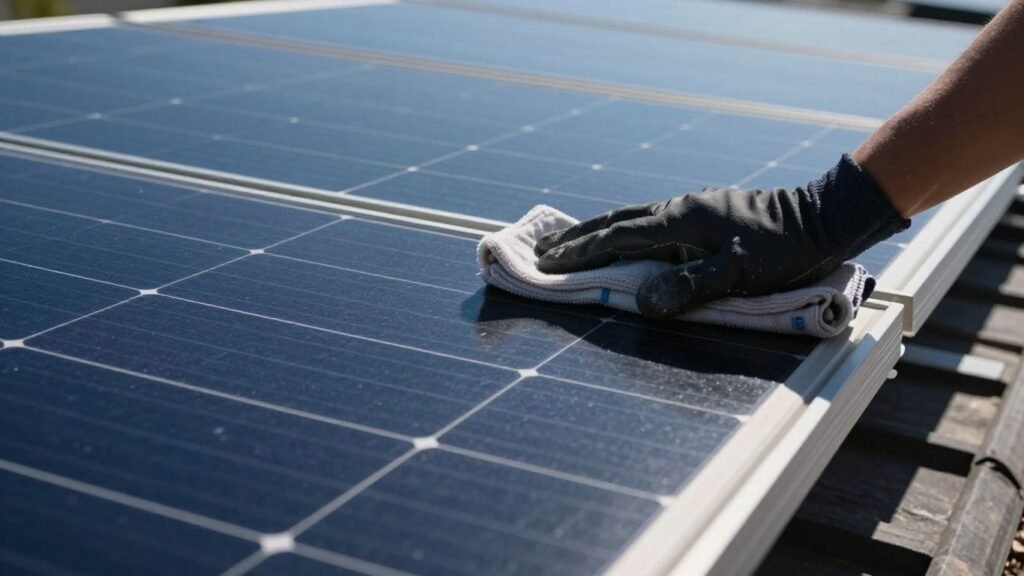Switching to solar energy offers a practical solution for lowering your carbon footprint. Imagine a world where your daily energy consumption leaves a minimal impact on the environment. By adopting solar power, you can take a significant step towards achieving this goal. But how exactly does solar energy achieve this reduction, and what are the implications for a greener future? Let’s explore the science behind this transformative energy source and its potential to reshape our environmental impact.
Read Our Latest Blog Posts
Stay updated with the newest trends and tips in solar energy.
🔗 Visit Blog
Key Takeaways
- Solar energy produces no greenhouse gas emissions, reducing carbon footprint.
- Switching to solar power decreases reliance on carbon-intensive energy sources.
- Using solar energy helps combat climate change by lowering CO2 emissions.
- Solar power contributes to environmental sustainability by reducing carbon emissions.
- Solar energy promotes a cleaner, greener future by reducing carbon footprint.
Benefits of Solar Energy
When considering the benefits of solar energy, it’s essential to acknowledge its remarkable impact on reducing carbon emissions.
By harnessing the power of the sun, you can significantly decrease your carbon footprint.
Solar energy systems generate electricity without producing harmful greenhouse gases, unlike traditional fossil fuels.
This means that utilizing solar power helps combat climate change by reducing the amount of carbon dioxide and other pollutants released into the atmosphere.
Additionally, solar energy is a renewable resource, meaning it will never run out, unlike finite fossil fuels.
Choosing solar energy for your home or business not only helps the environment but also saves you money in the long run by decreasing your reliance on expensive and polluting energy sources.
Embracing solar power is a proactive step towards a cleaner, more sustainable future for both you and the planet.
Carbon Footprint Reduction
Considering your carbon footprint is crucial in today’s world where environmental sustainability is a top priority.
By switching to solar energy, you can significantly reduce your carbon footprint and help combat climate change. T
raditional energy sources like coal and natural gas emit large amounts of carbon dioxide into the atmosphere, contributing to global warming.
In contrast, solar energy produces no greenhouse gas emissions during operation, making it a cleaner and more sustainable choice for the planet.
| Emotion | Impact |
|---|---|
| Guilt | Reduce emissions, save the planet |
| Hope | A better future for generations to come |
| Empowerment | Take control of your environmental impact |
| Optimism | Positive change through sustainable choices |
Cost Savings With Solar

To understand the financial benefits of solar energy, it’s essential to recognize the significant cost savings it can bring to your household or business.
By harnessing solar power, you can substantially reduce your electricity bills.
The initial investment in solar panels may seem daunting, but over time, you’ll see a remarkable decrease in your monthly utility expenses.
Additionally, many governments offer incentives, such as tax credits or rebates, to encourage the adoption of solar energy, further offsetting the upfront costs.
Furthermore, with net metering, excess energy generated by your solar panels can be sold back to the grid, providing you with additional savings or credits on your electricity bill.
This means not only lower monthly expenses but also potential earnings from your solar energy system.
Over the long term, the savings generated by solar energy can outweigh the initial installation costs, making it a financially sound decision for both your wallet and the environment.
Environmental Impact of Solar
As you explore the benefits of solar energy, it becomes evident that its impact extends beyond just cost savings.
The environmental advantages of solar power are significant. By harnessing energy from the sun, solar panels produce electricity without emitting harmful greenhouse gases or pollutants, unlike traditional fossil fuel-based power sources.
This reduction in greenhouse gas emissions contributes to combating climate change and improving air quality.
| Environmental Impact | Description | Benefit |
|---|---|---|
| Reduced Carbon Footprint | Solar energy generates electricity without emitting carbon dioxide, a major greenhouse gas. | Helps combat climate change. |
| Improved Air Quality | Solar power production does not release harmful pollutants that contribute to smog and respiratory problems. | Enhances overall air quality. |
| Conservation of Resources | Solar energy is renewable and abundant, reducing the reliance on finite fossil fuel resources. | Promotes sustainability and resource conservation. |
Embracing solar energy not only leads to economic savings but also plays a crucial role in preserving the environment for future generations.
Solar Energy for Sustainability
When you choose to adopt solar energy solutions, you aren’t just investing in a sustainable future but actively contributing to a cleaner and greener environment.
Solar energy is a key player in promoting sustainability by harnessing the power of the sun to generate electricity without producing harmful emissions.
By utilizing solar panels on rooftops or in solar farms, you can reduce your reliance on fossil fuels, which are finite resources that contribute to climate change.
One of the most significant benefits of solar energy for sustainability is its renewable nature. Unlike traditional energy sources like coal or natural gas, solar power is an abundant and inexhaustible resource.
This means that by going solar, you’re supporting a long-term energy solution that minimizes environmental impact and helps combat global warming.
Furthermore, solar energy systems have a minimal carbon footprint compared to conventional energy sources.
Conclusion
By making the switch to solar energy, you can significantly reduce your carbon footprint and help protect the environment for future generations. Not only will you save money on electricity bills, but you’ll also contribute to a more sustainable and cleaner energy future. So why wait? Start benefiting from the many advantages of solar power today and make a positive impact on the planet.
Frequently Asked Questions
Can Solar Panels Work During Cloudy Days?
Yes, solar panels can still work on cloudy days. Although they may produce less energy compared to sunny days, they can still generate power. The panels are designed to capture diffused light and convert it into electricity.
What Happens to Excess Solar Energy Produced?
When excess solar energy is generated, it can be stored in batteries, sold back to the grid, or diverted for heating water. Maximize your solar investment by utilizing smart systems that manage surplus power efficiently.
Do Solar Panels Require a Lot of Maintenance?
Solar panels don’t require a lot of maintenance. Regular cleaning and occasional inspections are all that’s needed. With proper care, they can continue generating clean energy efficiently for many years, making them a low-maintenance investment.
Can Solar Panels Be Installed on Any Type of Roof?
Yes, solar panels can be installed on most roof types. It’s essential to assess your roof’s condition and sun exposure for optimal performance. Hiring a professional installer ensures proper placement and maintenance, maximizing energy efficiency.
How Long Do Solar Panels Typically Last?
Solar panels typically last around 25-30 years with good maintenance. Regular check-ups ensure efficiency. You should monitor output levels and cleanliness. Consider factors like weather and quality of installation. By being proactive, you maximize panel lifespan.



